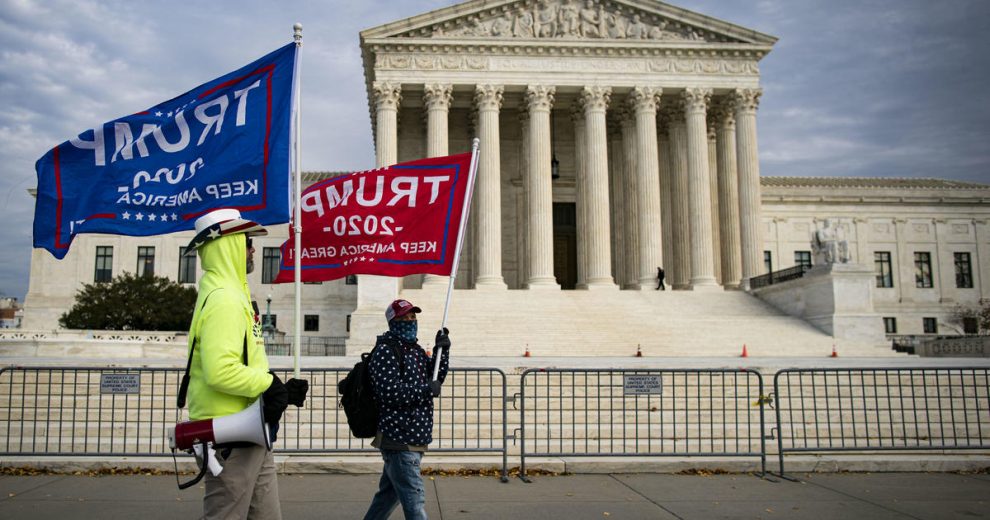More than 100 House Republicans on Thursday signed an amicus brief in support of the Texas lawsuit aimed at overturning the election results in four swing states — Georgia, Michigan, Pennsylvania and Wisconsin — that handed Democrat Joe Biden the White House.
“This brief presents [our] concern as Members of Congress, shared by untold millions of their constituents, that the unconstitutional irregularities involved in the 2020 presidential election cast doubt upon its outcome and the integrity of the American system of elections,” states the brief signed by 106 GOP lawmakers.
Outgoing Republican Study Committee Chairman Mike Johnson (La.) — one of President Trump’s closest allies in the House, having served on his impeachment defense team — helped lead the effort to garner support from his GOP colleagues for the brief. Johnson is joining the GOP leadership team in the new Congress.
“President Trump called me this morning to let me know how much he appreciates the amicus brief we are filing on behalf of Members of Congress. Indeed, ‘this is the big one!’ ” Johnson tweeted Wednesday.
Other key Republicans who signed the brief include Minority Whip Steve Scalise (La.); Rep. Jim Jordan (Ohio), the top Republican on the Judiciary Committee; Rep. Andy Biggs (Ariz.), the chair of the conservative Freedom Caucus; and Rep. Jim Banks (Ind.), the incoming Republican Study Committee chairman.
House Minority Leader Kevin McCarthy (R-Calif.), another top Trump ally, is not among the signatories. Neither is GOP Conference Chairwoman Liz Cheney (Wyo.). McCarthy twice declined to comment to reporters Thursday when directly asked if he supported the Texas lawsuit.
“The president has a right for every legal challenge to be heard. He has the right to go to the Supreme Court with it, yes,” McCarthy said.
The Electoral College is scheduled to meet on Monday to cast their votes, with Congress slated to vote on certifying the results Jan. 6.
Texas Attorney General Ken Paxton (R) on Tuesday filed a lawsuit to the Supreme Court aimed at blocking electors from Pennsylvania, Michigan, Wisconsin and Georgia from certifying Biden’s victory. Paxton alleges the states’ mail-in voting efforts during the pandemic were unconstitutional. Attorneys general from 18 other red states have joined that lawsuit.
The Trump campaign has largely been unsuccessful in its legal efforts to challenge the election results; dozens of challenges filed by Trump or his allies have been rejected by the courts. Trump has asked Sen. Ted Cruz (R-Texas), a former Texas solicitor general, to argue the latest case before the Supreme Court, The New York Times reported.
But the last-ditch Hail Mary has divided Republicans on Capitol Hill — and in the powerful Texas congressional delegation itself. For weeks, Rep. Kay Granger (Texas), the top Republican on the powerful Appropriations Committee, has been telling Trump it’s time to “move on” and accept defeat. And Rep. Chip Roy (R-Texas), a vocal Trump backer, voiced his concerns about the lawsuit on Twitter, opting not to sign on.
“Respectfully, I will not join because I believe the case itself represents a dangerous violation of federalism & sets a precedent to have one state asking federal courts to police the voting procedures of other states,” Roy said in a series of tweets.
Sen. John Cornyn (Texas), a member of the GOP leadership team, has also questioned the merit of the suit.
“You know, it’s very unusual because when a state sues a state, the Supreme Court of the United States has original jurisdiction,” Cornyn told CNN, “so you don’t have to go through the ordinary procedure. I read just the summary of it, and I frankly struggle to understand the legal theory of it.”
Story cited here.
























